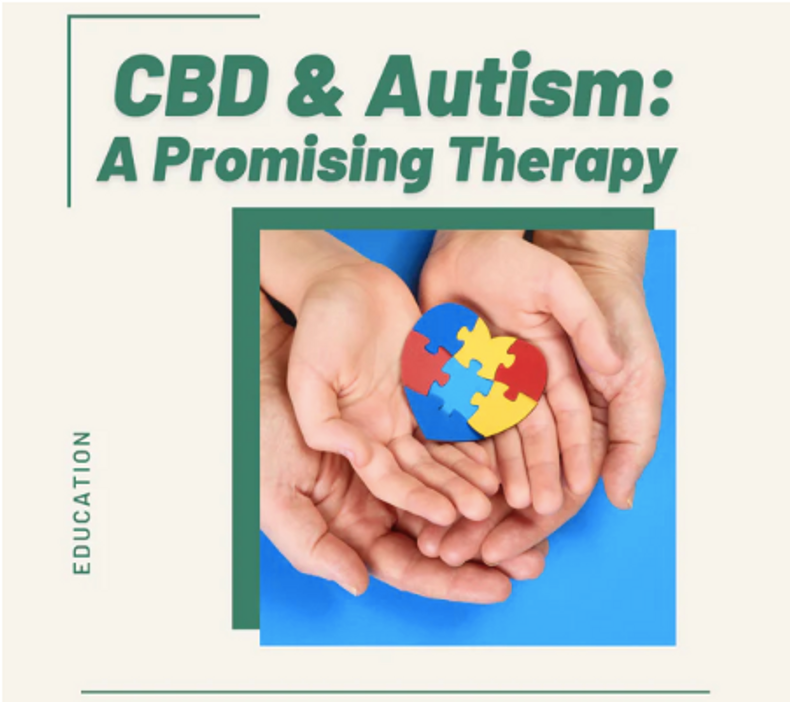
CBD & Autism
According to a systematic review of nine published studies on cannabinoids and autism conducted in 2021, cannabis may hold promise in the treatment of symptoms associated with Autism Spectrum Disorder (ASD). These studies demonstrated that cannabis products could improve a range of ASD symptoms, including self mutilation, anger outbursts, hyperactivity, sleep problems, anxiety, psychomotor agitation, irritability, aggressiveness, sensory sensitivity, cognition, attention, social interaction, language change, depression, and restlessness.
Currently, there are no definitive drugs or psychotherapeutic approaches capable of extensively improving the quality of life, social skills, and cognitive functioning of the most severe ASD cases. While available drugs can alleviate some symptoms, their effectiveness is limited and can have undesirable side effects. Understanding the Endocannabinoid System (ECS), which is the largest neurotransmitter system in the body and involved in regulating nearly every physiological process, is helpful in appreciating how cannabinoids work.
Lower Endocannabinoid Levels in Individuals with Autism
Research shows that individuals with ASD tend to have lower levels of endocannabinoids. This includes AEA, PEA, and OEA, compared to neurotypical individuals. It is suggested that naturally increasing endocannabinoid levels with Cannabidiol (CBD) or mimicking the actions of cannabinoids with Delta-9-Tetrahydrocannabinol (THC) can benefit those experiencing endocannabinoid deficiencies.
Studies have found that CBD can modulate different aspects related to cognition, socioemotional responses, susceptibility to seizures, nociception, and neuronal plasticity, which are often altered in autism. A 2019 study showed that CBD can change the levels of the metabolites glutamate, glutamine, and gamma-aminobutyric acid (GABA) in adults living with autism. Additionally, a 2018 study involving 60 children found that CBD-enriched cannabis improved behavioral outbreaks in 61%, communication problems in 47%, anxiety in 39%, stress in 33%, and disruptive behavior in 33% of the patients.
Although research on THC for ASD is limited, some studies suggest that it can benefitthose with hyperactivity, lethargy, irritability, stereotypy, inappropriate speech, and treatment-resistant self-injurious behavior. A recent study analyzed data collected from the treatment program of 188 ASD patients treated with medical cannabis between 2015 and 2017. They concluded that cannabis for autism appears to be well tolerated, safe, and effective in relieving symptoms.
THC & CBD for Autism Spectrum Disorder
Studies are gradually uncovering the potential benefits of THC for individuals with Autism Spectrum Disorder (ASD). However, the use of pure THC in research is rare due to the potential for heightened euphoric effects. It is suggested that a combination of THC and CBD may be more effective, as CBD has been shown to counteract the intoxicating effects of THC. For example, a 2010 study administered synthetic THC (Dronabinol) to a 6-year old boy with autism, resulting in significant improvements in hyperactivity, lethargy, irritability, stereotypy, and inappropriate speech at a 6-month follow up. The boy did not take any other medications during this period. In addition, a 2006 published study demonstrated improvement in the management of treatment resistant self injurious behavior following Dronabinol treatment.
The analysis of prospectively collected data from a treatment program for 188 ASD patients who were treated with medical cannabis between 2015 and 2017 has revealed recent findings. The majority of patients were treated with cannabis oil containing 30% CBD and 1.5% THC. After 6 months of treatment:
- 30% of patients reported a significant improvement in symptoms
- 53.7% experienced a moderate improvement
- 6.4% had slight improvements
- 8.6% reported no changes in their condition.
The study concluded that the use of cannabis for autism is well-tolerated, safe, and effective in alleviating symptoms associated with ASD.
Selecting the Right Product
Getting started with cannabinoid therapy can be overwhelming. Especially for those with a complex neurodevelopmental disorder like ASD, it is crucial to consult a healthcare provider before beginning any new treatment.
Choosing the right cannabinoid product can be daunting at first, but with some research into your endocannabinoid system and an understanding of which cannabinoids provide which benefits it becomes much easier. Be sure to take into account quality levels when selecting a product and make sure that it contains all the desired cannabinoids in its formula before making a purchase decision! Ultimately, by doing your research beforehand and talking to the experts at Happy Trails you can make an informed decision about which product is right for you!
Sources:

